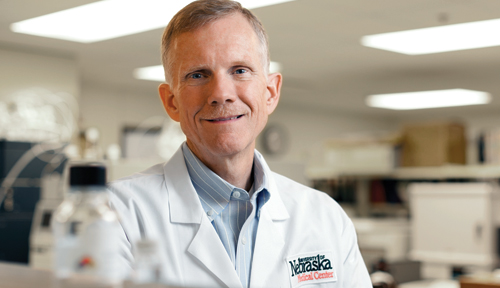Antiretroviral drugs developed by some of our nation's leading scientists have been extraordinarily effective against HIV, the virus that causes AIDS. These treatments have turned what used to have been a death sentence into a manageable, chronic condition. Thousands of people who previously likely would have died have instead gone on to live long, full, otherwise largely normal lives. And yet, unusually among infectious diseases, once we find drugs that work, we haven't been able to cure HIV. Why is that? Courtney Fletcher, Pharm.D., dean of the UNMC College of Pharmacy, is first author on a study published in the latest issue of Proceedings of the National Academy of Sciences that takes the first step toward answering that question.
NIH support for study
The work of Dr. Fletcher and his collaborators' was funded, in part, by a pair of National Institutes of Health grants.
"It's not a huge breakthrough," Dr. Fletcher said. "But we previously couldn't have a rational discussion about why we couldn't completely suppress replication of HIV throughout the body, which is a prerequisite to curing HIV infection. And now we can." Some would call that a huge breakthrough. Turns out, while anti-HIV drugs are effective at fighting the virus, these drugs are less effective at getting to where the virus actually replicates – in lymph and gut tissues. The drugs let patients live with HIV, but the persistent low-level replication keeps the virus from ever being completely knocked out. In short, Dr. Fletcher and his collaborators found that perhaps we haven't been able to cure HIV because these effective drugs aren't getting – in high enough dosages — where they need to go. Dr. Fletcher compared it to the challenge faced by those working to get treatment through the blood-brain barrier. Now scientists working toward a cure for HIV know what that challenge is. To reach these findings, Dr. Fletcher collaborated with a team that included University of Minnesota colleagues Timothy Schacker, M.D., UMN director of HIV Medicine, and Ashley Haase, M.D., Regents' Professor and head of microbiology at UMN. Drs. Schacker, Fletcher, Haase and their collaborators are working on a comprehensive study of all available anti-retroviral drugs and some new investigational drugs in an effort to identify a combination that will provide maximum penetration into lymph nodes and more effectively stop virus replication. How unusual is it for a dean to be doing this kind of cutting-edge research? Dr. Fletcher is one of two deans of Big Ten schools of pharmacy – Natalie Eddington, Ph.D., of Maryland, is the other – to maintain active research labs.
